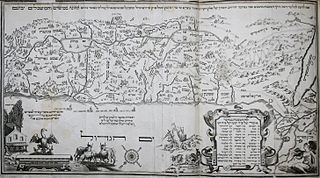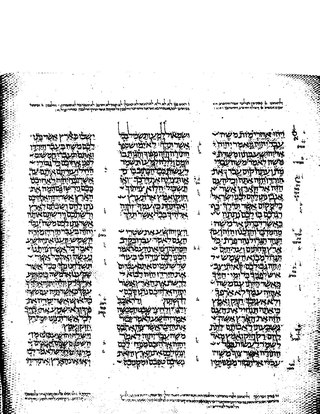Related Research Articles
The Book of Numbers is the fourth book of the Hebrew Bible and the fourth of five books of the Jewish Torah. The book has a long and complex history; its final form is possibly due to a Priestly redaction of a Yahwistic source made sometime in the early Persian period. However, this is a point of contention for many secular and biblical scholars. The name of the book comes from the two censuses taken of the Israelites.
The Book of Judges is the seventh book of the Hebrew Bible and the Christian Old Testament. In the narrative of the Hebrew Bible, it covers the time between the conquest described in the Book of Joshua and the establishment of a kingdom in the Books of Samuel, during which biblical judges served as temporary leaders. The stories follow a consistent pattern: the people are unfaithful to Yahweh; he therefore delivers them into the hands of their enemies; the people repent and entreat Yahweh for mercy, which he sends in the form of a leader or champion ; the judge delivers the Israelites from oppression and they prosper, but soon they fall again into unfaithfulness and the cycle is repeated. Scholars consider many of the stories in Judges to be the oldest in the Deuteronomistic history, with their major redaction dated to the 8th century BCE and with materials such as the Song of Deborah dating from much earlier.

According to the Hebrew Bible, the Tribe of Ephraim was one of the tribes of Israel. The Tribe of Manasseh together with Ephraim formed the House of Joseph. It is one of the ten lost tribes. The etymology of the name is disputed.
According to the Torah, Merari was one of the sons of Levi, and the patriarchal founder of the Merarites, one of the four main divisions among the Levites in Biblical times. The Hebrew word Merari means sad, bitter or strong. The Merarites were charged with the transportation and care of the structural components of the tabernacle.
The Gershonites were one of the four main divisions among the Levites in Biblical times. The Bible claims that the Gershonites were all descended from the eponymous Gershon a son of Levi, although some biblical scholars regard this as a postdictional metaphor providing an aetiology of the connectedness of the clan to others in the Israelite confederation.
According to the Torah, Gershon was the eldest of the sons of Levi, and the patriarchal founder of the Gershonites, one of the four main divisions among the Levites in biblical times. The Gershonites were charged with the care of the outer tabernacle including components such as the tent and its covering, screens, doors, and hangings. Biblical scholars regard the name as being essentially the same as "Gershom", which appears to mean "a sojourner there", and it is Gershom rather than Gershon who is sometimes listed in the Book of Chronicles as a founder of one of the principal Levite factions. The Torah names Gershon's sons as Libni and Shimei.

According to the Torah, Kehath or Kohath was one of the sons of Levi and the patriarchal founder of the Kehathites, one of the four main divisions of the Levites in biblical times. In some apocryphal texts, such as the Testament of Levi and the Book of Jubilees, Levi's wife, Kehath's mother, is Milkah, a daughter of Aram.
Kibzaim, or Cibsaim in the Douai-Rheims translation of the Hebrew Bible, Hebrew: קִבְצַ֙יִם֙, was a Levitical city of Ephraim, assigned to the Kohathite Levites.
The Merarites were one of the four main divisions among the Levites in Biblical times. The Bible claims that the Merarites were all descended from the eponymous Merari, a son of Levi, although some biblical scholars regard this as a postdictional metaphor, providing an origin myth of the connectedness of the clan to others in the Israelite confederation;.

In the Hebrew Bible, the Levitical cities were 48 cities in ancient Israel set aside for the tribe of Levi, who were not allocated their own territorial land when the Israelites entered the Promised Land.
Gibbethon or Gibbeton was a city in the land of Canaan which, according to the record in the Hebrew Bible, was occupied by the Tribe of Dan after the entry of the Israelites into the Promised Land and was then given to the Tribe of Levi, and which some identify as "Tel Malot", located northwest of the city of Beit Shemesh and due west of the city of Gezer. According to the Book of Joshua, it was given as a Levitical city to the Kohathites.

1 Chronicles 6 is the sixth chapter of the Books of Chronicles in the Hebrew Bible or the First Book of Chronicles in the Old Testament of the Christian Bible. The book is compiled from older sources by an unknown person or group, designated by modern scholars as "the Chronicler", and had the final shape established in late fifth or fourth century BCE. This chapter focuses on the tribe of Levi, divided into the line of the high priests ; the three lines of the families Gershom, Kohath, and Merari ; the lines of the musicians/singers ; duties of Levites and priests ; list of high priests and the Aaronites' and Levites' settlements. It belongs to the section focusing on the list of genealogies from Adam to the lists of the people returning from exile in Babylon.

1 Chronicles 26 is the twenty-sixth chapter of the Books of Chronicles in the Hebrew Bible or the First Book of Chronicles in the Old Testament of the Christian Bible. The book is compiled from older sources by an unknown person or group, designated by modern scholars as "the Chronicler", and had the final shape established in late fifth or fourth century BCE. This chapter describes particular duties of the Levites as gatekeepers, the temple treasurers, officers and judges. The whole chapter belongs to the section focusing on the kingship of David, which from chapter 22 to the end does not have parallel in 2 Samuel.

Joshua 12 is the twelfth chapter of the Book of Joshua in the Hebrew Bible or in the Old Testament of the Christian Bible. According to Jewish tradition the book was attributed to the Joshua, with additions by the high priests Eleazar and Phinehas, but modern scholars view it as part of the Deuteronomistic History, which spans the books of Deuteronomy to 2 Kings, attributed to nationalistic and devotedly Yahwistic writers during the time of the reformer Judean king Josiah in 7th century BCE. This chapter records the list of kings defeated by the Israelites under the leadership of Moses and Joshua, a part of a section comprising Joshua 5:13–12:24 about the conquest of Canaan.

Joshua 13 is the thirteenth chapter of the Book of Joshua in the Hebrew Bible or in the Old Testament of the Christian Bible. According to Jewish tradition the book was attributed to the Joshua, with additions by the high priests Eleazar and Phinehas, but modern scholars view it as part of the Deuteronomistic History, which spans the books of Deuteronomy to 2 Kings, attributed to nationalistic and devotedly Yahwistic writers during the time of the reformer Judean king Josiah in 7th century BCE. This chapter records the list of land still to be conquered and the land allotments for the tribes Reuben, Gad and half of the Manasseh (east), a part of a section comprising Joshua 13:1–21:45 about the Israelites allotting the land of Canaan.

Joshua 20 is the twentieth chapter of the Book of Joshua in the Hebrew Bible or in the Old Testament of the Christian Bible. According to Jewish tradition the book was attributed to the Joshua, with additions by the high priests Eleazar and Phinehas, but modern scholars view it as part of the Deuteronomistic History, which spans the books of Deuteronomy to 2 Kings, attributed to nationalistic and devotedly Yahwistic writers during the time of the reformer Judean king Josiah in 7th century BCE. This chapter records the designation of the cities of refuge, a part of a section comprising Joshua 13:1–21:45 about the Israelites allotting the land of Canaan.

Joshua 21 is the twenty-first chapter of the Book of Joshua in the Hebrew Bible or in the Old Testament of the Christian Bible. According to 0Jewish tradition the book was attributed to the Joshua, with additions by the high priests Eleazar and Phinehas, but modern scholars view it as part of the Deuteronomistic History, which spans the books of Deuteronomy to 2 Kings, attributed to nationalistic and devotedly Yahwistic writers during the time of the reformer Judean king Josiah in 7th century BCE. This chapter records the designation of "Levitical cities", a part of a section comprising Joshua 13:1–21:45 about the Israelites allotting the land of Canaan.

According to the Hebrew Bible, the Tribe of Reuben was one of the twelve tribes of Israel. Unlike the majority of the tribes, the land of Reuben, along with that of Gad and half of Manasseh, was on the eastern side of the Jordan and shared a border with Moab. According to the biblical narrative, the Tribe of Reuben descended from Reuben, the eldest son of the patriarch Jacob. Reuben, along with nine other tribes, is reckoned by the Bible as part of the northern kingdom of Israel, and disappears from history with the demise of that kingdom in c. 723 BC.

According to the Bible, the Tribe of Levi is one of the tribes of Israel, traditionally descended from Levi, son of Jacob. The descendants of Aaron, who was the first kohen gadol of Israel, were designated as the priestly class, the Kohanim.

According to the Hebrew Bible, the Tribe of Asher was one of the Tribes of Israel descended from Asher, the eighth son of Jacob. It is one of the ten lost tribes.
References
- ↑ Numbers 3:21
- ↑ Numbers 3:31–32
- 1 2 Joshua 21:20–26
- ↑ Israel Finkelstein, The Bible Unearthed
- ↑ 1 Kings 9:16
- ↑ "Palestine Exploration Fund, Quarterly Statement, January 1903"
 This article incorporates text from a publication now in the public domain : Singer, Isidore; et al., eds. (1901–1906). "Levi, Tribe of". The Jewish Encyclopedia . New York: Funk & Wagnalls.
This article incorporates text from a publication now in the public domain : Singer, Isidore; et al., eds. (1901–1906). "Levi, Tribe of". The Jewish Encyclopedia . New York: Funk & Wagnalls. This article incorporates text from a publication now in the public domain : Easton, Matthew George (1897). "Kohathites". Easton's Bible Dictionary (New and revised ed.). T. Nelson and Sons.
This article incorporates text from a publication now in the public domain : Easton, Matthew George (1897). "Kohathites". Easton's Bible Dictionary (New and revised ed.). T. Nelson and Sons.